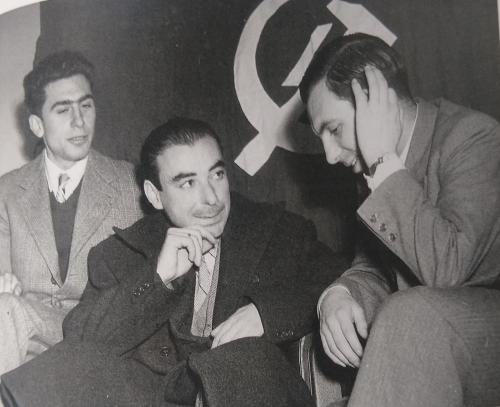
Rome, 1950. L to R: Leone Iraci, Alfonso Cascone, Livio Maitan. Photo: L'Europeo.
Recently, the political memoirs of the Italian Trotskyist Livio Maitan (Venice 1923 - Rome 2004), were translated into English. Together with Pierre Frank, Ernest Mandel, and others, Maitan worked for decades in the leadership of the Fourth International. Fortunately, he did so not only with unbridled dedication, but often also with the necessary humour.
Maitan's book is not, and does not pretend to be, the history of the Fourth International. One of the limitations of his memoirs is that they end somewhere in the mid-nineties of the last century. Because of illness Livio was unable to finish his book the way he had done with earlier chapters. Another limitation, apart from the individual perspective of Maitan himself, is that the book concentrates on the positions, discussions and many differences of opinion within the International, especially on the basis of the world congresses and splits. With a few exceptions, the histories of the affiliated organisations in their own national contexts are not, or only briefly, discussed. The Dutch section is not discussed, except for a moment very briefly in the early 1960s during the time of Sal Santen (of whom Maitan was not very fond). Amsterdam is of course mentioned as the location of the IIRE, the international school of the Fourth, and as the site of the ‘Euromarsen’ at the end of the nineties.
Yet these memoirs of Maitan - together with the limited number of biographies and memories of others and together with the many publications of the Fourth and its sections - are an important contribution and a good stepping stone towards a better understanding of the history of the Fourth International. The easy-to-read book of course highlights many national and international histories from the second half of the last century. The book also offers chunks of the history of different countries, of movements, and of activists who are in danger of being forgotten, but who are worth remembering and studying and who still have an impact on our time.
Above all, the book makes clear how extremely difficult it was, and is, to build a revolutionary International from the weak positions in the current, long historical period. Many of the lessons that can be learned from the history of the Fourth International and its sections are, of course, more or less applicable to other revolutionary organisations as well. At the same time, Maitan's memoirs show how beneficial it is for people and organisations to be part of a functioning International (despite all its limitations and weaknesses) and to be part of international socialist discussions and connections.
In his book, Maitan also shows how difficult it sometimes was to quickly make a correct assessment of major events in the world and of their consequences for international power relations and the potential for new struggles. Think for example of the consequences of the Second World War, the death of Stalin and the rise of Khrushchev, the anti-colonial revolutions and counter-revolutions, May '68, the generalized world recession in 1975, the rapid changes in Afghanistan, the revolution in Cuba, the fall of the Wall, the rise of China, etcetera.
Maitan's book is also a legacy and a tribute to the many people who have made the choice in their lives to become active as revolutionary socialists or who have otherwise been active in an often hard struggle against oppression and exploitation. Not a few paid for this choice with their lives.
For Maitan it was important not only to work in the leadership of the Fourth International and to visit and study many countries and organisations, but also to be directly politically active in the class struggle in 'his' Italy, so that he knew well what was happening 'on the ground' and what the leadership of the Fourth International could and could not do.
Livio Maitan died in Rome in September 2004, at the age of 81, leaving behind memories and many articles and books. One of them is Party, Army and Masses in China. At his funeral Lidia Cirillo, Alain Krivine and Fausto Bertinotti, among others, spoke at the request of Livio himself.
Livio Maitan, ''Memoirs of a critical communist; Towards a history of the Fourth International''. Preface by Daniel Bensaïd. Resistance Books, IIRE, Merlin Press. (Translated by Gregor Benton, Penelope Duggan worked on the many notes and references, and provided a useful overview of names of organisations and individuals). The book can be ordered here.
Rob Gerretsen.
